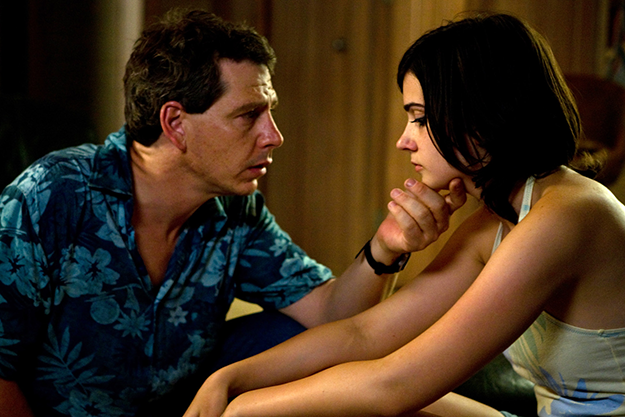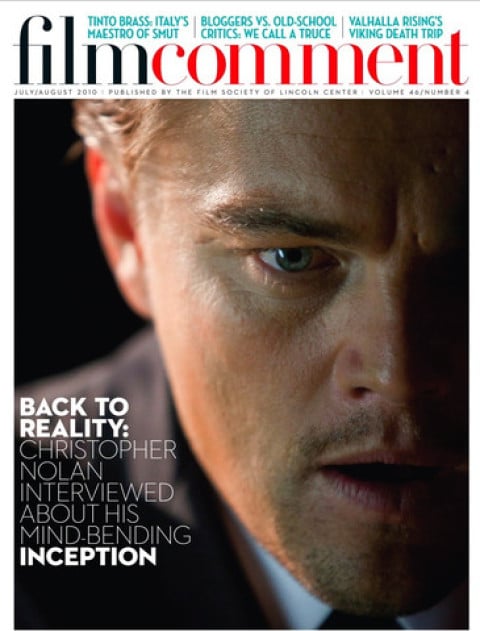
If you think that Air Supply’s sappy slow-dance essential “All Out of Love” couldn’t possibly give you goose bumps, think again. The song drives a scene midway through David Michôd’s gripping criminal-family tale Animal Kingdom: its video flickers on a TV screen in a dark living room, as the camera pans cautiously past the film’s teenage protagonist, asleep on the couch with his girlfriend, to the tortured face of his uncle Pope, the oldest of three hot-blooded brothers. From its first few notes, the power ballad sends chills—of dread, not joyful anticipation. And this is just one haunting moment in a film teeming with them; for the entire duration the sense of unease is relentless, the nerve-wracking sound design and use of slow motion impeccable. Seldom is a debut feature handled with such assurance and intelligence. It’s no wonder the film walked away with the World Cinema Jury Prize at Sundance this year and recently opened to near-unanimous praise on its home turf.
Michôd, a former editor of Inside Film magazine, is a founding member of Blue-Tongue Films, a collective of young, primarily Aussie talent—writers, directors, actors, stuntmen—who work in music videos, shorts, and features. Australian film history has always been intriguing, but lately it’s been those in front of the camera who’ve stolen the spotlight. Not since Peter Weir broke through in the late Seventies (along with his contemporaries in the so-called Australian New Wave) has the country produced a filmmaker with as much promise as Michôd.
The Blue-Tonguers could now be appropriately labeled the Next New Wave. What’s distinctive about this generation is how tightly knit they are; if one person is involved, chances are that others will appear somewhere in the credits. In fact, pages could be devoted just to their varied functions and cross-connections. (Explaining their collaborative origins, Michôd simply says: “Somehow we all started doing things together—making shorts, working on each other’s shorts, general monkey business.”) The careers of Michôd’s friends and colleagues should prove as interesting to follow as his own. They share with him a dark outlook and a penchant for relatively innocent lead characters who find themselves in way over their heads. Their works might touch on the familiar, but they still have the ability to enter surprising territory.

For years Nash and Joel Edgerton have been presenting genre shorts that have startled and delighted on the festival circuit. Their first feature, The Square, is a noirish thriller that takes on the trusty robbery-gone-wrong premise: it starts with a seemingly harmless scheme, meant to ensure escape for an adulterous May-December couple, and escalates from there, heading toward disaster. Spider, the short that precedes it theatrically, which Nash directed, starred in, and co-wrote with Michôd, features a bickering couple in a car that also takes a sudden turn for the worse, albeit with perhaps a dash more humor. A throwaway bit of background action in The Square that references Spider could be said to symbolize the intersection of the Blue-Tongue filmmakers’ output and shared sensibilities.
Spencer Susser, the sole American of the bunch, directed the upcoming Hesher and co-wrote it with Michôd. (Susser met Nash on the Australian set of Star Wars Episode II: Attack of the Clones.) At Hesher’s forefront is a put-upon 13-year-old pipsqueak who mourns the death of his mother, while also having to contend with a strange new (uninvited) houseguest who throws his life into further disarray.
Within most everything Michôd writes, a pessimistic view of family pervades, always from the perspective of young protagonists from broken homes, whose parents are numb (Hesher), sadistic (Animal Kingdom), useless (the stunning 2007 short Crossbow, stylistically the closest to Animal Kingdom), absent (the 2008 short Netherland Dwarf)… or zombies (I Love Sarah Jane, another 2008 short, directed by Susser). It’s surprising to learn then that Michôd actually had a perfectly agreeable upbringing. “I have nothing to complain about,” he relates. “Having said that, I don’t recall ever particularly enjoying being a kid—I’m a much happier adult—and so I can only assume there’s something subterranean and mysterious I’m trying to work through there.”
The remainder of Blue-Tongue is made up of actor/stuntman Tony Lynch, and actor and sometime writer/director Kieran Darcy-Smith, who appears briefly in Animal Kingdom. Darcy-Smith also headlines Miracle Fish, a short that was nominated this year for an Academy Award and was directed by final member Luke Doolan (Animal Kingdom’s editor).
In the wrong hands, Animal Kingdom, the most striking film of any length to come from the group yet, could have been just another crime drama. It’s based on a particularly volatile chapter in Melbourne’s history—the late Seventies through the early Nineties, when there was little distinction between cop and criminal—and specifically on a murder-revenge case known as the Walsh Street killings. (The crime novels of Tom Noble, who eventually served as a script consultant on the film, were also an inspiration.) But while the era forms the basis for Animal Kingdom, the focus is more intimate: the Cody clan and their friend and business associate Barry “Baz” Brown (Joel Edgerton) and corrupt lawyer Ezra White (Dan Wyllie). The film begins with the arrival of Joshua “J” (newcomer James Frecheville), who comes to live with his grandmother and uncles after his mother, the only female Cody sibling, overdoses on heroin. Aside from J, a somewhat anesthetized teen of few words who nevertheless comes across as a decent sort, one of the only other characters to emerge as truly upstanding is police detective Leckie (Guy Pearce)—the rare cop with any morals—who goes above and beyond the call of duty in trying to protect Joshua.
Animal Kingdom is a project that’s been in the works for nearly a decade. In the course of its lengthy preparation, Michôd shot his first short, Ezra White, LL.B., also starring Wyllie, in 2006, the year Blue-Tongue was formed. About this practically unseen effort, the director reports: “Ezra White is a lost work sadly. Possibly deliberately lost. I made Ezra as a way of proving myself as a director in the course of trying to get Animal Kingdom up and running. I took a smaller character from Animal Kingdom and gave him his own little world to play in. It didn’t really work—it played like a couple of test scenes and ultimately felt badly executed and semi-pointless.” Whether the short was mere exercise or something more, Animal Kingdom’s long gestation period provided just the right space for Michôd to develop both his craft (in addition to the shorts mentioned, he co-directed an hour-long award-winning doc, Solo (08), about a kayak crossing of the Tasman Sea) and the rich characters that inhabit his new film.

The Cody brothers are electrifying creations. Ben Mendelsohn is stunning as Pope, an armed robber, drug dealer, and murderer in hiding, who is by turns menacingly unstable (even his mother hints that perhaps it’s time he went back on his meds) and pathetic (he often tries to get family members to confide in him, never with any success). Middle brother Craig (Sullivan Stapleton) is more belligerent and less sharp; the youngest, the impressionable Darren (Luke Ford) is the most human, and clearly a victim of his surroundings. With different relatives, it’s possible that he, like J, might have stood a chance.
Heading the family, and perhaps even more terrifying than her offspring, is Smurf (played with bone-chilling perfection by Jacki Weaver). At first glance she’s someone you might be happy to call “Grandma,” before realizing that she dotes on her sons to a disturbing degree—like kissing them on the mouth for just a little too long—while quietly controlling them. In terms of screen villainesses, Ma Barker has nothing on Smurf. In terms of sheer potential, Michôd is currently unrivaled. Even if what’s next is classified: “I’m bubbling a few options at the moment,” he offers unassumingly, “and they’re all totally top secret. I’m not entirely sure why they’re top secret—they just are.”









